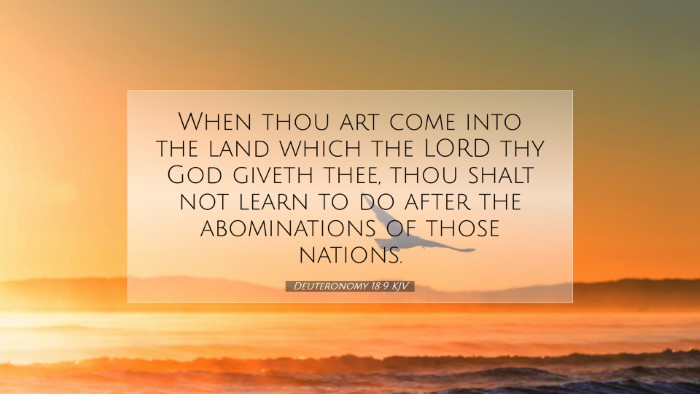Commentary on Deuteronomy 18:9
Verse: "When you come into the land which the Lord your God is giving you, you shall not learn to follow the abominable practices of those nations."
Introduction
The command in Deuteronomy 18:9 addresses the Israelites as they prepare to enter the Promised Land. This verse serves as a critical reminder to the community about the significance of spiritual integrity and the dangers of adopting the customs of surrounding nations. It lays the groundwork for establishing a society that honors God in all aspects of life.
The Historical Context
The Israelites were on the brink of entering Canaan, a land filled with diverse cultures and religions. The previous nations had practices that were often in direct opposition to God's commandments. Matthew Henry articulates that this verse is a warning against the allure of idolatry and the moral corruption prevalent among the Canaanites.
Examination of Practices Forbidden
In this verse, the term "abominable practices" refers specifically to the detestable religious customs and rituals of the Canaanites, including child sacrifice, divination, and witchcraft. Albert Barnes elucidates that these practices were not just mere cultural differences; they were fundamentally opposed to the character of God and the covenant relationship He established with Israel.
Spiritual Purity and Separation
This warning calls for the necessity of spiritual purity and separation from pagan influences. Adam Clarke emphasizes that the Israelites were to remain distinct from those nations, not merely in worship but in their overall conduct and ethics. He points out that adopting such practices could lead to a total abandonment of their faith and identity.
Application for Today
The instruction found in Deuteronomy 18:9 is relevant for contemporary readers as well. In a world where various cultural practices can clash with biblical teachings, believers are challenged to discern and uphold their faith in the face of external pressures. It is crucial to recognize that the church's integrity relies on its commitment to divine principles over societal trends.
Implications for Leadership
This passage highlights the responsibility of leaders in the faith community. Pastors and church leaders must guide their congregations in understanding the importance of maintaining spiritual attitudes and practices that align with God's word. As Matthew Henry notes, the failure of leaders to adhere to these principles can lead to widespread corruption within the community.
Conclusion
Deuteronomy 18:9 serves as a steadfast reminder for ancient Israel and modern believers alike to reject practices that compromise their relationship with God. By understanding the historical context and the implications of this verse, pastors, students, and theologians can better navigate their faith journeys and lead others in the pursuit of holiness and truth.
Recommendations for Further Study
- Explore the surrounding verses: Understanding the context of Deuteronomy 18:9 within the larger chapter can provide deeper insights.
- Study the historical practices of the Canaanites: This can illuminate why God was so adamant against the adoption of such customs.
- Engage with contemporary issues: Reflect on how modern cultural practices may challenge the integrity of faith today.
- Seek commentary from various theologians: Diverse perspectives can enrich understanding of Scripture.


